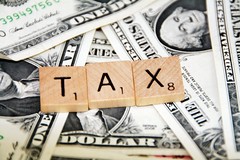
Tax (Photo credit: 401K)
The Tax System Explained in Beer ? Daniel J. Mitchell ? Townhall Finance Conservative Columnists and Financial Commentary.
In my explanations of the Laffer Curve, I?ve shown evidence that high tax rates discourage productive behavior and boost the underground economy.
And if higher tax rates are sufficiently onerous, the resulting reductions in taxable income can completely offset the revenue-generating impact of higher tax rates. Indeed, this is what?s already happened with the ?Snooki tax.?
And the same thing happens in reverse. If lower tax rates lead to a big enough increase in taxable income, the government actually collects more revenue ? which is exactly what happened when the top tax rate was lowered in the 1980s.
I?ve also tried to explain, shifting from economics to philosophy, that confiscatory tax rates are unfair and immoral. And I?m glad to see that most Americans agree, with 75 percent of all people saying that nobody should ever face a tax rate of more than 30 percent.
Notwithstanding that polling data, though, I fear that many people don?t really understand the economics of taxation. So I?m happy to share this little story that periodically winds up in my inbox.
===============================================
Suppose that every day, ten men go out for beer and the bill for all ten comes to $100. If they paid their bill the way we pay our taxes, it would go something like this?
- The first four men (the poorest) would pay nothing
- The fifth would pay $1
- The sixth would pay $3
- The seventh would pay $7
- The eighth would pay $12
- The ninth would pay $18
- The tenth man (the richest) would pay $59
So, that?s what they decided to do.
The ten men drank in the bar every day and seemed quite happy with the arrangement, until one day, the owner threw them a curve ball.
?Since you are all such good customers,? he said, ?I?m going to reduce the cost of your daily beer by $20?. Drinks for the ten men would now cost just $80.
The group still wanted to pay their bill the way we pay our taxes. So the first four men were unaffected. They would still drink for free. But what about the other six men ? How could they divide the $20 windfall so that everyone would get his fair share?
The bar owner suggested that it would be fair to reduce each man?s bill by a higher percentage the poorer he was, to follow the principle of the tax system they had been using, and he proceeded to work out the amounts he suggested that each should now pay.
- And so the fifth man, like the first four, now paid nothing (100% saving).
- The sixth now paid $2 instead of $3 (33% saving).
- The seventh now paid $5 instead of $7 (28% saving).
- The eighth now paid $9 instead of $12 (25% saving).
- The ninth now paid $14 instead of $18 (22% saving).
- The tenth now paid $49 instead of $59 (16% saving).
Each of the six was better off than before. And the first four continued to drink for free. But, once outside the bar, the men began to compare their savings.
?I only got a dollar out of the $20 saving,? declared the sixth man. He pointed to the tenth man,?but he got $10!?
?Yeah, that?s right,? exclaimed the fifth man. ?I only saved a dollar too. It?s unfair that he got ten times more benefit than me!?
?That?s true!? shouted the seventh man. ?Why should he get $10 back, when I got only $2? The wealthy get all the breaks!?
?Wait a minute,? yelled the first four men in unison, ?we didn?t get anything at all. This new tax system exploits the poor!?
The nine men surrounded the tenth and beat him up.
The next night the tenth man didn?t show up for drinks so the nine sat down and had their beers without him. But when it came time to pay the bill, they discovered something important. They didn?t have enough money between all of them for even half of the bill!
And that, boys and girls, journalists and government ministers, is how our tax system works. The people who already pay the highest taxes will naturally get the most benefit from a tax reduction. Tax them too much, attack them for being wealthy, and they just may not show up anymore. In fact, they might start drinking overseas, where the atmosphere is somewhat friendlier.
===============================================
Very well done. Reminds me of the PC version of the story about the ant and the grasshopper, or perhaps the joke about using two cows to explain various economic and political systems.
And if you like those, you?ll appreciate this modern fable about bureaucracy, featuring an ant and a lion.
Like this:
4 bloggers like this post.
yorkshire pudding larry the cable guy miracle on 34th street santa tracker monkey bread letter from santa sweet potato pie
No comments:
Post a Comment
Note: Only a member of this blog may post a comment.